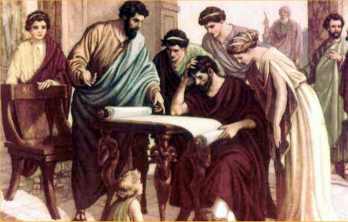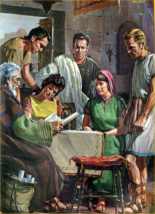Bible study through questioning, seeking, growing, and immersion in truth and wisdom.
"Thy word is a lamp unto my feet."



| Bibledelve.com
Bible study through questioning, seeking, growing, and immersion in truth and wisdom. "Thy word is a lamp unto my feet." |
 |
 |
 |
Bible Organization
The bible consists of 66 books written by different people over 1500 years. The bible starts in Genesis with a description of the creation of the world and ends in Revelation with a description of the end of the age. The bible is divided into two parts commonly called the Old Testament and the New Testament.
What is a "Testament"?
The word testament is meant to convey the idea of a covenant or contract between God and his people. The first five books of the bible, Genesis, Exodus, Leviticus, and Deuteronomy were written by Moses and describe from the creation of the world through the establishment of the nation of Israel. In the book of Exodus (the departure from Egypt) an account is given of God asking the nation to accept his law. The ten commandments are symbolic of this offer and the entire nation agreed. This was the first covenant (testament).
Most of the Old Testament is a description of the failure of Israel to follow the law. The nation even split in two (called Israel and Judah). Many prophets are recorded as being sent by God to warn the two nations to give up their rebellion, idolatry, and immorality. Many of the Old Testament books are the warnings of these prophets. The nation was promised that they would be given a new covenant.
The New Testament is a description of the offer of the New covenant (testament) to the nation of Israel. The first four books of the new Testament are called the gospels (from the Greek for "good news"). They describe Jesus as the promised Messiah (meaning anointed, Christos in Greek). The nation was invaded by Rome and the city of Jerusalem destroyed in 70 AD. Israel did not respond in acceptance of the second covenant as they had the first.
There is a major split in Christian circles today as to whether the new covenant will be established in the future to a restored nation of Israel along with the promised kingdom or whether the kingdom was established with the church to replace the nation of Israel. The book of Acts which describes the events that occurred after the ascension of Jesus to heaven is key to how one views the New Testament (covenant).
|
Books of the Bible |
||||||||||||||
| Old Testament | New Testament | |||||||||||||
| The Law |
History |
The Gospels | History | Paul to churches | ||||||||||
| Genesis | Joshua | Chronicles (1,2) | Matthew | Acts | Romans | |||||||||
| Exodus | Judges | Ezra | Mark | Corinthians (1,2) | ||||||||||
| Leviticus | Ruth | Nehemiah | Luke | Paul to individuals | Galatians | |||||||||
| Numbers | Samuel (1,2) | Esther | John | Timothy (1,2) | Philippians | |||||||||
| Deuteronomy | Kings (1,2) | Titus | Ephesians | |||||||||||
| Philemon | Colossians | |||||||||||||
| Poetry | Major Prophets | Thessalonians (1,2) | ||||||||||||
| Job | Isaiah | |||||||||||||
| Psalms | Jeremiah |
Letters by others |
||||||||||||
| Proverbs | Lamentations | Peter (1,2) | John (1,2,3) | Hebrews | ||||||||||
| Ecclesiastes | Ezekiel | James | Jude | Revelation | ||||||||||
| Song of Solomon | Daniel | |||||||||||||
|
Minor Prophets |
||||||||||||||
| Hosea | Jonah | Zephaniah | ||||||||||||
| Joel | Micah | Haggai | ||||||||||||
| Amos | Nahum | Zechariah | ||||||||||||
| Obadiah | Habakkuk | Malachi | ||||||||||||